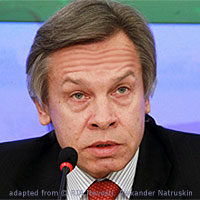Senior Russian MP says U.S. strike on Syria would spread nuclear weapons

(Interfax – Moscow, September 5, 2013) A US military strike on Syria may prompt a whole range of countries to acquire nuclear weapons for the sake of their own security, Aleksey Pushkov, head of the Russian State Duma International Affairs Committee, has said.
“They (the Americans) think that a strike will show the determination of the USA to firmly respond to challenges to American geopolitical interests and reinforce American hegemony in the world. In my view, quite the opposite will occur: those countries that do not yet have nuclear weapons will think about whether they need to make them, because only the presence of nuclear weapons will be a guarantee against American aggression,” Pushkov told Interfax on Thursday (5 September).
He said the United States wants to use a military operation to send a certain signal to countries before whom it previously drew certain ‘red lines’.
“For example, before the government of North Korea regarding the fact that they should not make a nuclear weapon; before the government of Iran, saying they should give up their nuclear programme or not take this programme along the road of creating a nuclear weapon; before the governments of certain other countries,” Pushkov said.
“I think that, in trying to confirm its hegemony, the USA is going along the road of all empires, which believe that force will allow them to hold onto a very weak position. The result is always the opposite. The forces of an empire become overstretched and its attraction and authority are reduced. It also comes to be not respected, but feared, and it is not considered a genuine leader, but a country from which one might expect the use of the armed forces at any moment,” Pushkov said.
He said this will lessen the authority both of the USA and of (US) President Barack Obama, “who in effect becomes a second Bush”.
“We see how, having started talks about peace, he is ready to start yet another one of his wars. The first was the Libyan one. The Americans prefer to remain quiet about that – that a Nobel Peace Prize laureate is already starting his second war without ending a single one. I think that the consequences for the United States – the near-term if not the medium term ones, including for America’s image in the world – will be sharply negative,” Pushkov said.
He said the American administration is interested in conducting a military operation in Syria as quickly as possible, since “the more time passes after the scandal surrounding the use of chemical weapons, the more the propaganda smoke around this scandal disperses”.
The media is already receiving information which raises increasingly more doubts that the American administration is legitimately accusing (Syrian President) Bashar al-Asad’s government of using chemical weapons, he said.
“So it has emerged that a Syrian who regularly appeared on air on a Western TV company with reports and testimony about the atrocities of government forces was an actor who received instructions from the editorial office of that TV company,” Pushkov said.
He also said that Syrian militants had admitted to a Western correspondent “that they received from their Arab handlers some strange cylinders which they were to bring to certain suburbs of Damascus”. They said they did not have any suspicions about the purpose of the containers, but, judging by the description, it looked like containers that could contain chemical substances, Pushkov said.
“It emerges that there is every reason to believe that not only Al-Asad’s government has chemical weapons, as American propaganda insists, but that the militants also have them in some form or other. So it is not beneficial (for the Americans) to drag out a military strike since this propaganda hysteria created by the Western media needs to be constantly fed, it has a certain shelf life, like the chemical substances,” Pushkov said.
[featured image is file photo]
